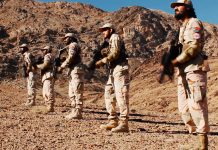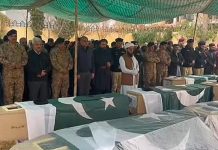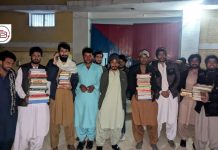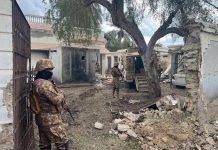Author: Jamal Baloch
“On the night of March 25, 1971, thousands of soldiers fanned out in Dhaka and other population centres of East Pakistan, the Pakistan military intent on crushing the Bengali movement for independence. Operation Searchlight targeted political leaders, students and radicals, unarmed civilians, even women and children. Soldiers attacked universities, raided newspaper offices, and wiped out entire villages”, writes Ehsan Butt in his book “Secession and Security: Explaining State Strategists against Separatists”. Today, a few decades later, these scenes can be watched live in the villages of Balochistan; nothing seems to have changed except for the venue of the Pakistani army’s oppression and the mastery of repression it has gained. “Just 225 days [after Balochistan’s independence in 1947], the Pakistani military invaded Balochistan and surrounded the capital at Kalat Palace, forcing the Khan to sign an accession agreement” (Rooney, 2010). Although Pakistani oppression in Balochistan is nothing new and the army has managed successfully to conceal its dirty work for decades, with the increasing social media activism, it is now leaking out. Since its colonization in 1948, Balochistan has been pillaged; it has been destroyed and plunged into abject misery. Despite being so rich that its people could have survived a lifetime without any effort, today they are one of the most necessitous nations.
The Baloch resistance emerged immediately in 1948, when Agha Abdul Karim proposed a separatist movement against Pakistan, through armed struggle. As the Baloch resistance grew, the oppression they faced intensified. “In one counterinsurgency operation, Pakistani troops, frustrated by their inability to root out Baloch guerrillas in the mountains, decided to bomb, strafe, and burn the homes of some 15,000 local Baloch residents. When the insurgents rushed out from their hideouts to defend their women and children, a bloodbath ensued with over 5,000 Baloch rebels killed” (Rooney, 2010). With the inception of economic megaprojects in Balochistan, the Pakistani army unleashed frustration and uncompromising resistance to any opposition from Baloch insurgents. In doing so, as Amnesty International reports, “since 2011, hundreds of Baloch people have been disappeared only to be killed by Pakistani security forces as part of a state policy known as kill and dump” (UNPO, 2019). These include not only nationalist leaders, but professors, students and human rights activists as well (HRW, 2011). Enforced disappearances, the kill and dump policy, collective punishment, forced displacement, burning of villages, and a systematic genocide of Baloch people explicate who the true beneficiary of these projects is.
In particular, the establishment of the China-Pakistan Economic Corridor (CPEC) did not only aggravate Balochistan’s economic exploitation but meant doubling counterinsurgency efforts as excess Chinese money was invested in the project. “While Balochistan accounts for some 68 percent of Pakistan’s natural gas production, most Balochs are gut-wrenchingly poor, living in sparse shantytowns without access to clean water or paved roads” (Rooney, 2010). In fact, “an average resident of Balochistan is likely to be twice as poor as his counterpart living in any of the other three provinces”, earning less than a dollar per day (Ahmed & Baloch, 2017). Although CPEC was merchandised as a ‘game changer’ to the locals, it was clear nothing will change for the poor Baloch except for the worse.
Thus, it was necessary for Baloch insurgents to accommodate their plans and efforts to resist, not only the brutal Pakistani army, but anyone linked to it. These include the state-sponsored death squads, which turned up all over Balochistan to execute the army’s dirty work, and the Chinese.
Roads, hospitals, schools and other basic infrastructure are “at worst non-existent and at best inadequate” (Ahmed & Baloch, 2017). Recently, with the COVID19 pandemic, decades-long Pakistani oppression in Balochistan has become even more conspicuous. The lack of medical healthcare has always resulted in casualties from minor diseases but it never felt so frustrating as the pandemic spreaded. The so-called government of Balochistan, a puppet in the hands of the army, instead of covering up their incompetence to provide Balochistan with sufficient medical equipment, at least 50 doctors were arrested in Quetta for demanding personal protective equipment kits (Aljazeera, 2020). Later, two reported death squad attacks made headlines as two women identified as Malik Naz Baloch, who was killed in front of her 4 year-old daughter Bramsh who also was injured during the attack, and Kulsoom Baloch, who was killed and robbed in front of her children. These two incidents produced a new wave of protests demanding the total elimination of army-backed death squads in Balochistan. However, state-controlled media tried to manipulate the issue by creating false narratives and confusion to divert attention from Balochistan and its issues. Lastly, to practice social distancing, it became imperative to stop all in-person teaching and pursue online classes. However, online classes themselves became a crisis for students all over Balochistan due to lack of internet facilities. Thus, students organized mass peaceful protests, demanding the restoration of internet services in Balochistan. But these students “many of them female — were manhandled, baton-charged and arrested, with many being dragged into police vans” (Global voices, 2020).
Since its colonization, all rights of the Balochs have been violated. Living in Balochistan has become synonymous with oppression, misery and death. Whether someone calls out army atrocities or not, they face the same fate. Such behaviour with students, activists, women and children and anyone who is legitimately an inhabitant of Balochistan can never be tolerated. In such circumstances, the Baloch resistance and its national struggle for freedom are not in any form illegitimate; rather, they are obligatory.
Over the years, Baloch insurgent groups have conducted numerous attacks, both inside and outside Balochistan. Most recently, an attack on Pakistan Stock Exchange in Karachi was carried out by members of the Baloch Liberation Army (BLA). The state, through its opinion makers, used this attack to propagate against the Baloch movement. This also sparked a debate about how justifiable the group’s attack as part of nationalist insurgency is. The attack was condemned by few, and some called out the group for spreading terrorism instead of genuinely advancing the struggle for Balochistan’s rights. There were also discussions of whether such an attack can be considered rightful through the lens of international law. Some blamed the group of sidetracking current important efforts for the recovery of Balochistan’s missing persons by conducting such an ‘impractical’ attack just to make ‘a headline’.
In 1970, the Declaration on Principles of International Law Friendly Relations and Co-operation Among States in accordance with the Charter of the United Nations was adopted by the UN General Assembly. It clearly stated that “armed intervention and all other forms of interference or attempted threats against the personality of the State or against its political, economic and cultural elements, are in violation of international law. No State may use or encourage the use of economic, political or any other type of measures to coerce another State in order to obtain from it the subordination of the exercise of its sovereign rights and to secure from its advantages of any kind”. Then, in 1974, the UN General Assembly passed a resolution to clarify and define the term ‘aggression’ mentioned in Chapter VII of the UN Charter which was adopted in 1945. The historic Resolution 3314 affirmed, “the duty of States not to use armed struggle to deprive people of the right to self-determination, freedom and independence, or to disrupt territorial integrity”. Furthermore, it affirmed that no territory shall be “the object, even temporarily, of military occupation or of other measures of force”. The Resolution also stated that “the invasion or attack by the armed forces of a State of the territory of another state, or any military occupation, however temporary, resulting from such invasion or attack or any annexation by the use of force of the territory of another state or part thereof” is an act of aggression. The resolution identified and affirmed the right to self-determination through armed struggle: “Nothing in this Definition could in any way prejudice the right to self-determination, freedom and independence, of peoples forcibly deprived of that right, particularly peoples under colonial and racist regimes or other forms of alien domination; nor the right of these peoples to struggle to that end and to seek and receive support”.
While the resolution uses the word ‘struggle’, it is commonsensical that it refers to armed struggle in this context as it is defining aggression and exceptions to it. Thus, this Resolution, admitting the occupation of Balochistan as it was forcefully annexed into Pakistan in 1948 through the use of military force, affirms the legitimacy of the Baloch armed struggle to restore their independence. Accordingly, the Baloch insurgents may also seek external support in their national struggle for freedom. A suppressive state like Pakistan, which publicly endorses the Palestinian and Kashmiri armed struggles for self-determination, deny such a right when it comes to the Baloch national struggle. In reality, those who Pakistani occupiers designate as ‘terrorists’ and ‘traitors’ are lawfully practising their rights which are prescribed by international law.
In international humanitarian law, there is no one explicit definition of terrorism. However, there are many international conventions, adopted under the auspices of the United Nations, that outline what acts are justifiable in armed struggle and what would be deemed as terrorist acts. Academics have also written extensively to reach a comprehensive understanding of this sensitive topic. In differentiating between terrorists and freedom fighters, Professor Boaz Ganor (2002) argues that the targets of an attack define who is what. He argues that, under international humanitarian law, those who specifically target the military are guerilla fighters, whilst terrorist groups knowingly attack civilians. The proposed definition by professor Ganor is in accordance with the conventions and instruments that collectively form the core of international humanitarian law. A fact sheet titled “Human Rights, Terrorism and Counter-Terrorism”, published by the Office of the United Nations High Commissioner for Human Rights, defines who may be attacked during an armed conflict. It states, “attacks may be directed only at military objectives, i.e., those objects which by their nature, location, purpose or use make an effective contribution to military action and whose total or partial destruction, capture or neutralization, in the circumstances applicable at the time, offers a definite military advantage”. Therefore, any attack directed towards military objects cannot be designated as a terrorist attack. Further, the sheet states that “civilians lose their protection as civilians for such time as they participate directly in the hostilities”.
In light of these definitions and the broader body of international law, it would be unfair to designate the recent attack by the BLA as ‘terrorist’. The attack was clearly not aimed against civilians. The Pakistan Stock Exchange usually has more than 2000 employees, but the attack was carried out at a time when most employees are working from home. BLA fighters targeted Pakistani forces and attempted to limit to the minimum civilian casualties possible. This is evident, as reportedly, in addition to four security guards and a sub-inspector, only 2 civilians were killed. Even while carrying out an attack in a crowded city like Karachi, the fighters did not target any passerby in the street or any other residents and non-combatant civilians of the area. The fighters could have easily targeted any residential area or public place in Karachi, bearing in mind that they entered a highly secured zone carrying heavy arms and explosives. However, Baloch fighters have always indicated that their targets are those involved in any anti-Baloch projects, importantly the CPEC. These targets include the Pakistani army and all those who are linked to it, namely military-backed death squads and the Chinese who are aiding the Pakistani army to cease the Baloch insurgency as quickly as possible.
What is a matter of serious concern, which is often overlooked and ignored by those who constantly talk about international law and terrorism, is the Pakistani army’s behaviour in the name of counter-terrorism. The Pakistani army has constantly attacked civilians, burned villages and abducted hundreds and thousands of Baloch activists and students without any legitimate charges, only to dump their mutilated bodies later. “According to the international conventions, any deliberate attack upon civilians in wartime by regular military forces is already defined as a war crime” (Ganor, 2002). The Pakistani army has perpetrated high-scale terrorist activities and war crimes in the name of counter-terrorism; there cannot be a second opinion on this whatsoever. Pakistan is known internationally for sheltering and funding regional terrorist groups. Recently, Pakistani prime minister Imran khan called Osama bin Laden ‘a martyr’. Balochistan’s armed struggle against such a state is the only way for its national survival and lawful practice of the right to self-determination.
References
Ahmed, M., & Baloch, A. (2017). The Political Economy of Development: A Critical Assessment of Balochistan, Pakistan.
Butt, A. (2017). Secession and Security: Explaining State Strategy against Separatists. Ithaca; London: Cornell University Press. Retrieved from www.jstor.org/stable/10.7591/j.ctt1w0d9w9
Ganor, B. (2002). Defining terrorism: Is one man’s terrorist another man’s freedom fighter?. Police Practice and Research, 3(4), 287-304.
Global Voices (2020). “Students arrested for demanding internet facilities in Balochistan”. Retrieved from https://advox.globalvoices.org/2020/06/29/students-arrested-for-demanding-internet-facilities-in-balochistan/
Hashim, A. (2020). “Pakistan arrests doctors protesting for coronavirus medical gear”. Aljazeera. Retrieved from https://www.aljazeera.com/news/2020/04/pakistan-arrests-doctors-protesting-coronavirus-medical-gear-200407092323621.html
HRW (2011). “Pakistan: Upsurge in Killings in Balochistan”. Retrieved from
https://www.hrw.org/news/2011/07/13/pakistan-upsurge-killings-balochistan
Office of the United Nations High Commissioner for Human Rights. “Human Rights, Terrorism and Counter-terrorism”, Fact Sheet No. 32. Retrieved from https://www.ohchr.org/documents/publications/factsheet32en.pdf
Rooney, J. J. (2010, Autumn). The Baloch insurgency and 21st century asian energy security. The New Presence (Online), 81-87. Retrieved from https://search-proquest-com.virtual.anu.edu.au/docview/865338180?accountid=8330
The Declaration on Principles of International Law Friendly Relations and Co-operation Among States in accordance with the Charter of the United Nations. Retrieved from
https://www.un.org/ruleoflaw/files/3dda1f104.pdf
United Nations. “Charter of the United Nation”. Retrieved from https://www.un.org/en/sections/un-charter/chapter-vii/index.html
United Nations. “Resolution 3314: Definition of Aggression”. Retrieved from https://undocs.org/en/A/RES/3314(XXIX)
UNPO (2019). “Balochistan: Hundreds of Baloch Rights Activists Detained, Tortured and Murdered as Part of the State’s Kill and Dump Policy”. Retrieved from https://unpo.org/article/21644
Disclaimer: The views and opinions expressed in this article are those of the author and do not necessarily reflect the official policy or position of The Balochistan Post or any of its editors.






























